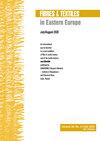Study on the Multi-Directional Static Friction Properties of High Performance Yarns
IF 0.9
4区 工程技术
Q3 MATERIALS SCIENCE, TEXTILES
引用次数: 0
Abstract
Abstract To further optimise the bullet-proof performance of textile reinforced composites, multi-directional friction tests of aramid and ultra-high molecular weight polyethylene (UHMWPE) yarns were carried out by the slope method. The influence of the included angle between the high-performance yarns on the static friction coefficient for aramid and UHMWPE yarns was studied by measuring the friction coefficient. The relationship between the static friction coefficient and the included angle among the high-performance yarns was discussed. The results showed that the friction coefficient of aramid yarns was higher than that of UHMWPE yarns. Especially, at the same included angle between high-performance yarns, the static frictional coefficient of aramid yarns is 50% higher than that of UHMWPE yarns. In accordance with expectations, the static friction coefficient decreases with the increased included angle between high-performance yarns, and the included angle of high-performance yarns changes from 0º to 90º. The trend of rapid decline appeared when the included angle between high-performance yarns changed from 0º to 15º. For the actual result, the static friction coefficient of aramid and UHMWPE yarns is less than 0.3, which needs to be improved to increase the bullet-proof performance of textile composites.高性能纱线多向静摩擦性能的研究
摘要为了进一步优化织物增强复合材料的防弹性能,采用斜率法对芳纶和超高分子量聚乙烯(UHMWPE)纱线进行了多向摩擦试验。通过测定芳纶和超高分子量聚乙烯纱线的静摩擦系数,研究了高性能纱线夹角对静摩擦系数的影响。讨论了高性能纱线间的静摩擦系数与夹角之间的关系。结果表明,芳纶纱线的摩擦系数高于UHMWPE纱线。特别是在高性能纱线夹角相同的情况下,芳纶纱线的静摩擦系数比UHMWPE纱线高50%。与预期一致,静摩擦系数随着高性能纱线夹角的增大而减小,高性能纱线的夹角从0º变为90º。当高性能纱线夹角从0º变化到15º时,出现了快速下降的趋势。对于实际结果,芳纶和超高分子量聚乙烯纱线的静摩擦系数小于0.3,这需要改进以提高织物复合材料的防弹性能。
本文章由计算机程序翻译,如有差异,请以英文原文为准。
求助全文
约1分钟内获得全文
求助全文
来源期刊

Fibres & Textiles in Eastern Europe
工程技术-材料科学:纺织
CiteScore
1.60
自引率
11.10%
发文量
12
审稿时长
13.5 months
期刊介绍:
FIBRES & TEXTILES in Eastern Europe is a peer reviewed bimonthly scientific journal devoted to current problems of fibre, textile and fibrous products’ science as well as general economic problems of textile industry worldwide. The content of the journal is available online as free open access.
FIBRES & TEXTILES in Eastern Europe constitutes a forum for the exchange of information and the establishment of mutual contact for cooperation between scientific centres, as well as between science and industry.
 求助内容:
求助内容: 应助结果提醒方式:
应助结果提醒方式:


